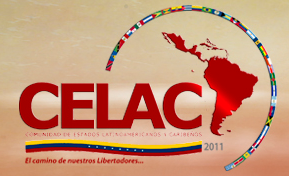The founding Summit of Heads of State and Government of the newly formed Community of LAC States (CELAC) has agreed on: a Declaration on Ecuador's Yasuní ITT Initiative; and an Action Plan creating a new energy cooperation body that will seek regional energy integration and promote cooperation on renewable energy, biofuels and greenhouse gas (GHG) mitigation.
 6 December 2011: The founding Summit of Heads of State and Government from 33 Latin America and Caribbean (LAC) countries has agreed that the newly formed Community of LAC States (CELAC) shall work together to take common positions and form regional strategies in a variety of policy areas, including energy.
6 December 2011: The founding Summit of Heads of State and Government from 33 Latin America and Caribbean (LAC) countries has agreed that the newly formed Community of LAC States (CELAC) shall work together to take common positions and form regional strategies in a variety of policy areas, including energy.
The Summit, held from 2-3 December 2011, in Caracas, Venezuela, brought together all countries in the Americas except Canada and the US to form a new forum to serve as an alternative to the Organization of American States (OAS), where Canada and the US participate but from which Cuba has been barred for nearly 40 years.
The Summit adopted the Declaration of Caracas, the Caracas Action Plan, and a series of “special communiqués” on issues such as food security, terrorism and nuclear arms. One such declaration applauds Ecuador’s Yasuní ITT Initiative to forgo oil exploitation and the resulting carbon emissions, and calls on the international community, based on the principle of common but differentiated responsibilities, to contribute to the Trust Fund for the Initiative administered by the UN Development Programme (UNDP).
The Caracas Declaration sets out the general principles and aspirations of CELAC, instructs the Chairman Pro-Tempore (President Sebastian Peñera of Chile) to implement the Caracas Action Plan, and members’ Foreign Ministers to submit proposals on allocating the necessary financial and material resources to support that implementation. The document does not, however, agree on a permanent secretariat or how CELAC will take decisions in the future. These questions are to be decided at a 2012 summit to be held in Chile.
The Action Plan outlines intended CELAC work in priority areas, including energy. On that issue, it calls for: creating a CELAC body composed of the national authority in each member country with responsibility for energy matters; regarding the guidelines of the Union of South American Nations’ (Unasur) May 2010 South American Energy Strategy as an element for CELAC’s work on regional energy integration; and promoting the exchange of experiences that may contribute to sustainable development through energy diversification, the incorporation of technologies and additional sources of income in the agricultural sector, as well as the mitigation of greenhouse gas (GHG) emissions. [CELAC Summit Documents]